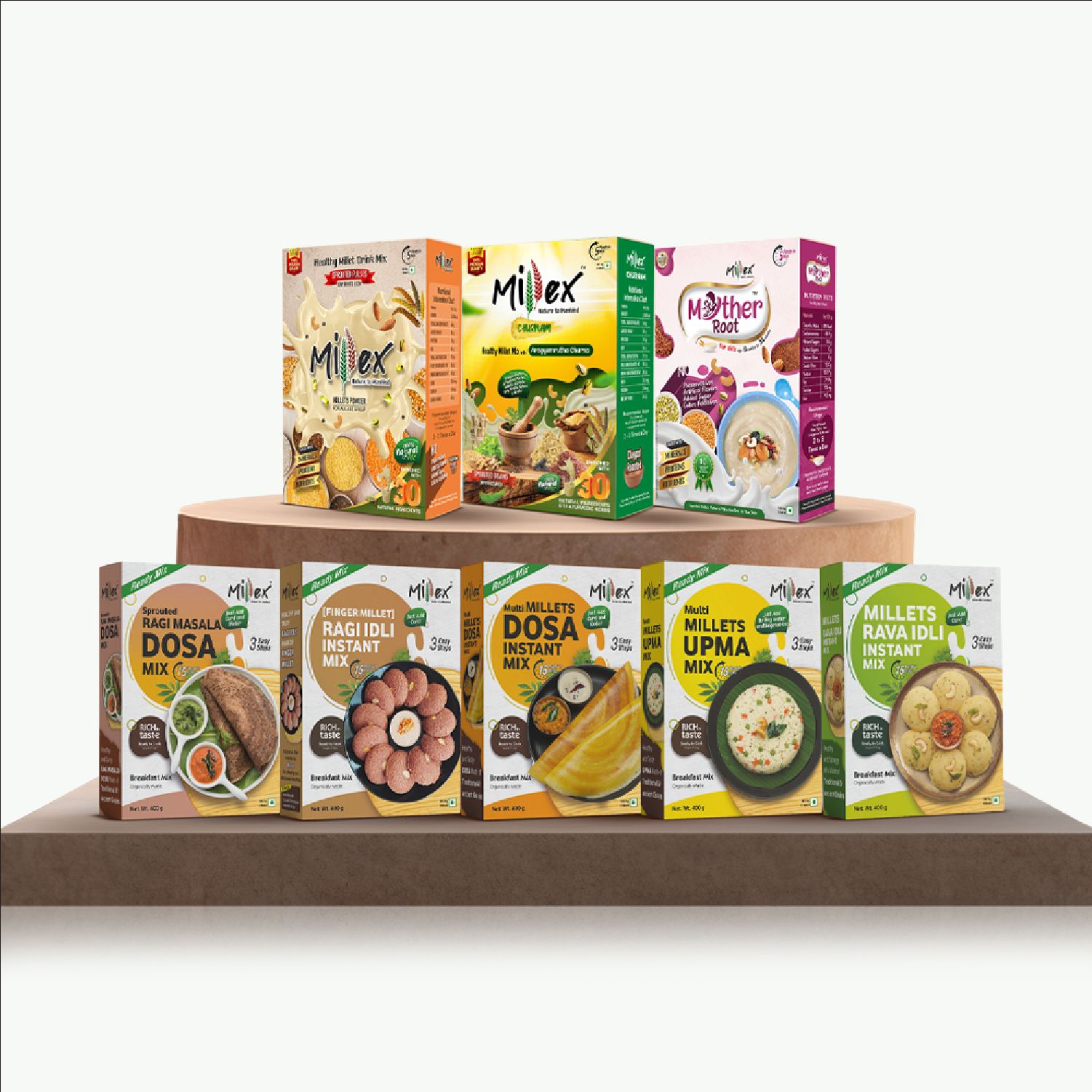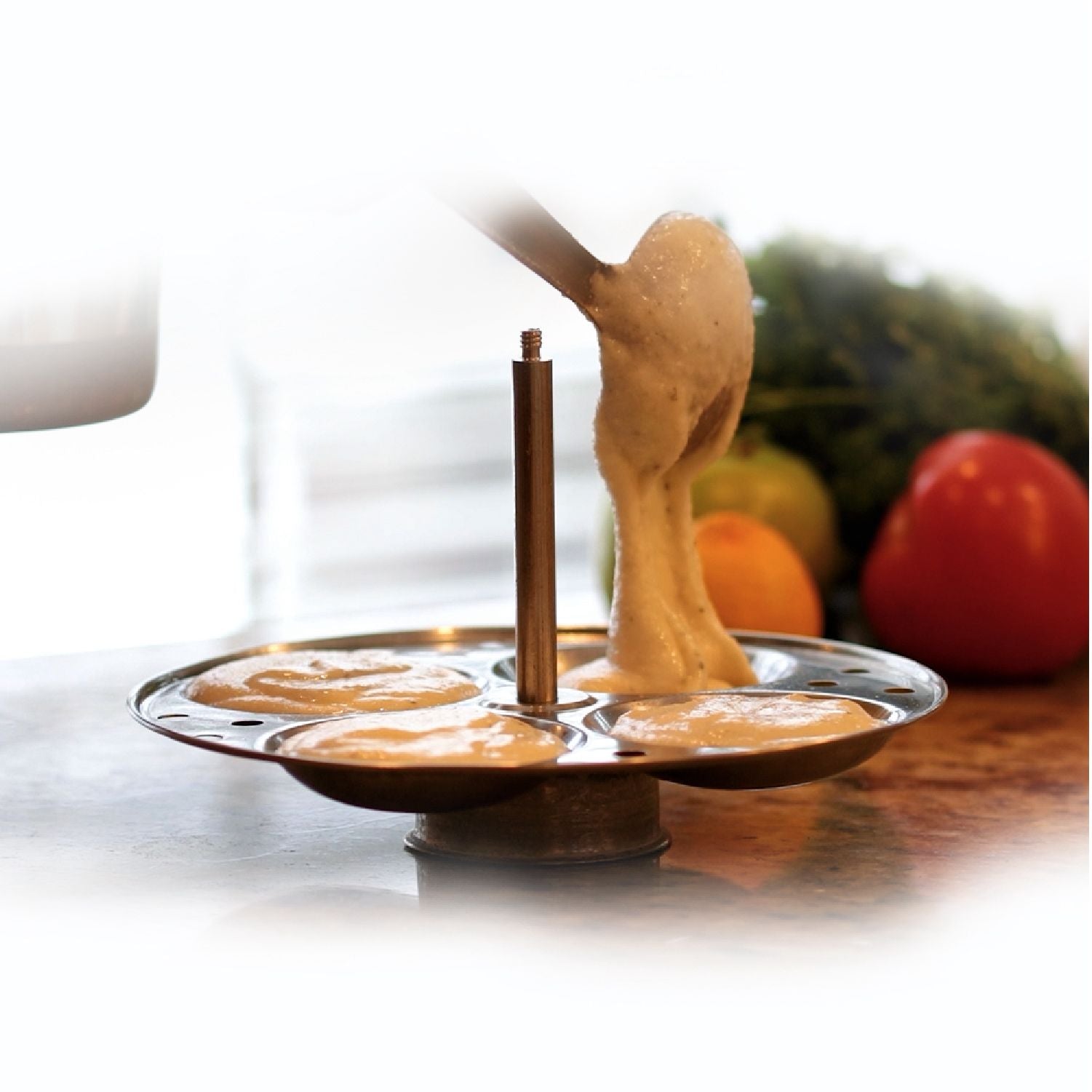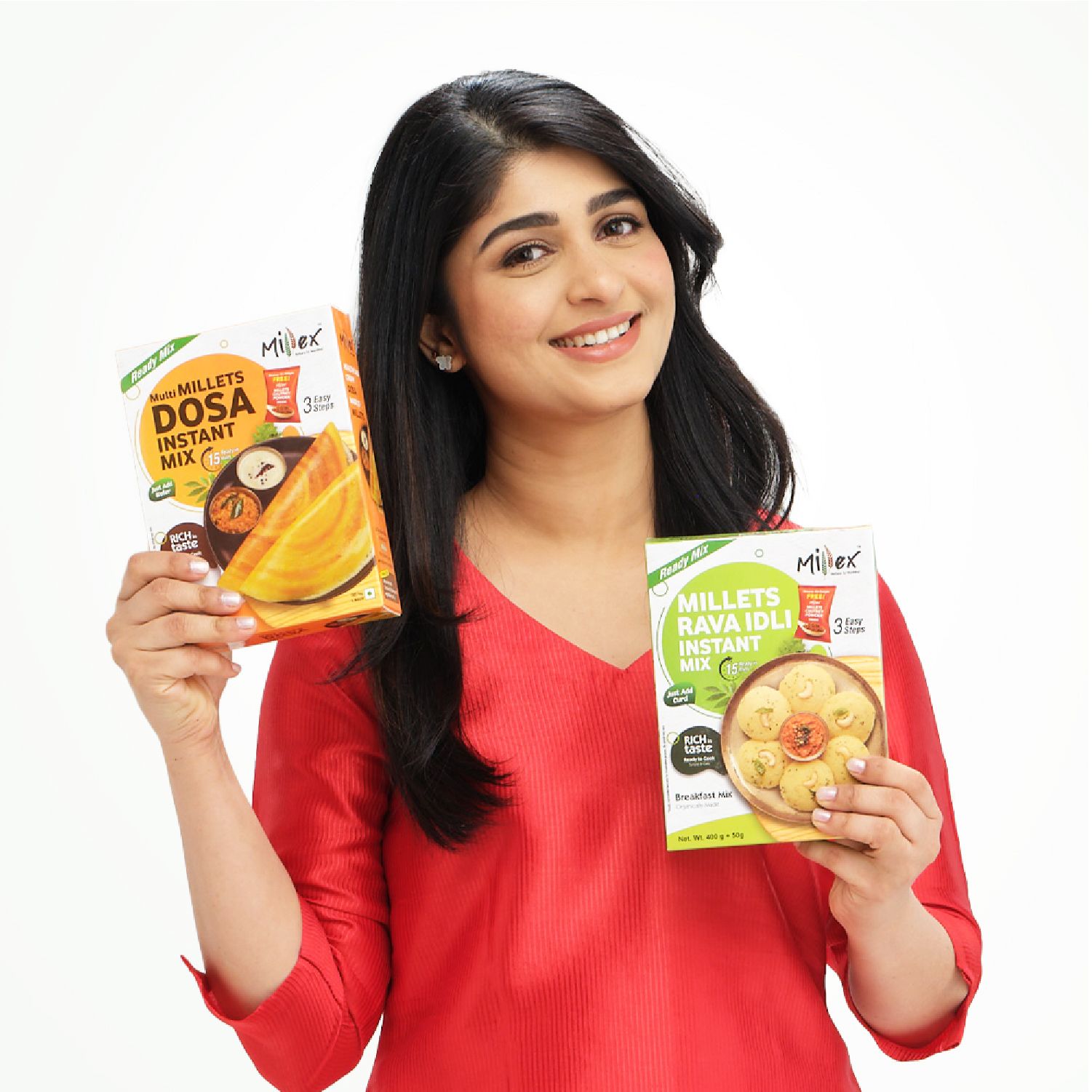Millets are the powerhouse of nutrition—rich in fiber, protein, and minerals that boost digestion, heart health, and weight management. Choose Millex for a healthy start every day!
Have you noticed why suddenly everyone started eating millets? Once a lowly constituent of yesteryear Indian food, the little seeds are now creating a stir globally, and they should. Millets are high in fibre, highly nutritious, and entirely gluten-free, and that is why they form a clever option for anyone who plans on eating clean and staying healthy.
They facilitate digestion, facilitate weight loss, and regulate blood sugar, all while providing you with the energy required to tackle the day. When you crave a light, gluten-free cereal, a slow-burning meal, or a natural means of diabetes control, millets are the answer.

Let us now see the highest health benefits of millets, learn why millets are so nutritious, and understand how adding them to your diet can actually revolutionise your entire well-being.
What Makes Millets Special?
Millets are ancient grains that have been feeding humans for centuries. Millets are water-efficient and use less water than rice or wheat, making them an eco-friendly and sustainable choice. Apart from their farming uses, the nutritional quality of millets makes them a better option than refined grains.
They contain more protein, fibre, vitamins, and minerals. Millets are also digested slowly, providing a steady flow of energy into your body without causing any blood sugar spikes. These features qualify them for the needs of today’s health, from controlling diabetes to gut and heart health.
1. Better Support for Digestive Health
If you have frequent constipation or bloating, millets can be helpful. They are fibre-rich millets that keep your tummy smiling and digestion smooth.
The high fibre content ensures proper movement of the bowel and avoids constipation. It also nourishes the good bacteria in your gut, resulting in improved digestion and immunity. The millets for digestion and gut health are particularly helpful for individuals who consume highly processed foods that contain low fibre intake.
Millets are rich in prebiotics, food for good gut bacteria. A healthy gut equals improved nutrient uptake, less inflammation, enhanced mood, and stronger immunity. Millets are easy to digest and light, so they are easy on the stomach but keep your digestive system stimulated and clean.
2. Great Heart Health Protection
Your heart needs nurturing, and millets can provide that. Millets are high in magnesium, potassium, and fibre, all three heart health nutrients.
Magnesium helps to stabilise your heart rhythm, and potassium helps maintain normal blood pressure. Fibre that is found in millets reduces bad cholesterol, reducing your risk for heart disease. Millet’s antioxidants shield your arteries from oxidative stress.

Individuals consuming millets as part of their daily diet can reduce the risk of heart conditions, stroke, or elevated blood cholesterol. Over a period of time, all these benefits of millets lead to a healthier, more powerful, and energetic life.
3. Better Blood Sugar Control
For diabetics or people most likely to develop it, millets are a lifesaver. They contain low glycemic value, that is, they release the sugar into your bloodstream at a slow rate. This prevents immediate shoots in blood sugar levels following meals.
The fibre in millet slows down the process of digestion, making you feel full and less hungry. This makes millets for diabetes and millets for weight loss a powerful combination. Rather than relying on processed carbs like white rice or maida, switching to millets regulates your insulin levels and improves energy balance.
Other research also indicates that consumption of millets can lead to improved pancreatic function, the organ responsible for the secretion of insulin. Consumption of millet daily, along with proper exercise, maintains healthy blood glucose levels and overall metabolic health.
4. Excellent Antioxidant Protection
Body oxidative stress may be induced by daily stress, pollution, and processed foods. Millets may counteract the effects of their high content of antioxidants, such as phenolic acids and flavonoids.
Antioxidants neutralise toxic free radicals that can damage cells. Antioxidants retard ageing, maintain healthy skin, and improve your immune system. Consumed regularly, millets can reduce the risk of inflammatory diseases like arthritis or some types of cancer.

In short, millets guard your cells, sharpen your attention, and age you young and fresh. All these benefits of eating millets show how millets serve as a natural shield that keeps you strong from within.
5. Essential Mineral and Vitamin Support
Millets are highly mineralised with iron, calcium, magnesium, and phosphorus, and B vitamins that support your body in a number of ways.
➔ Iron: Averts anaemia and keeps energy levels stable.
➔ Calcium: Enhances the strength of bones and teeth.
➔ Magnesium and phosphorus: Aids in muscle and nerve functions.
➔ B vitamins: Improve brain power, concentration, and metabolism.
This nutritional food profile supplies millets to all, particularly children, women, and the elderly. The iron richness of the millets makes them suitable for vegetarians whose diet is generally poor in this very essential nutrient. Upon frequent consumption, the health advantages of millets are the increase in energy, bone strength, and mental function.
Nutritional Value of Millets
The nutritional value of millets is what makes them stand out. On average, millets have:
➔ 10-12% protein for muscle preservation and health
➔ 8-12% fibre for improved digestion and fullness
➔ B-vitamins such as niacin, thiamine, and riboflavin for energy metabolism
➔ Minerals such as iron, magnesium, phosphorus, and potassium are needed for bone maintenance and heart function
Millets are also gluten-free foods, therefore safe for those who are afflicted with celiac disease or gluten intolerance. The gluten-free grains benefits are better digestion, reduced bloating, and a healthier gut. Compared to white flour or rice, millets will make you feel full for a longer duration of time and give you sustained energy all day long.
Millets for Weight Loss
If you are looking to lose weight naturally, millets are your best friend. Millets are poor in calories and rich in fiber, so they keep you full for longer, thus avoiding overeating.

Due to their slowly digestible carbohydrates, millets give consistent energy without a crash of sugar levels. This avoids unhealthy snacking and permits gradual weight loss. The high protein and fiber help boost the metabolism and nourish the lean muscle building.
Including fibre-rich millets, such as foxtail, barnyard, or finger millet, in your diet enhances digestion, lowers fat storage, and makes weight management more convenient.
Millets for Diabetes and Digestive Health
Diabetes patients are best served by including millets in their diet. The millets stabilize blood sugar levels, balance the gut, and enhance the utilization of nutrients. They also lower inflammation within the digestive system, keeping your gut healthy and comfortable.
Millets are nature’s prebiotics because they nourish good bacteria in your gut. A healthy gut regulates blood sugar, lowers bad cholesterol, and enhances your immune system overall. That's why the millet’s digestion and gut health connection is so strong.

For people with diabetes, millets can be taken daily to lower fasting blood sugar and increase insulin sensitivity. Their steady release of energy keeps your body charged and alert throughout the day.
Why Millets Are Healthy
There are many reasons for why millets are healthy, and they’re referred to as the future of smart eating.
1. They are gluten-free and easily digestible.
2. They provide steady energy without a spike in sugar.
3. They protect your heart and keep your blood pressure normal.
4. They improve digestion and support gut balance.
5. They are packed with antioxidants and minerals for full-body wellness.
How to Incorporate Millets into Your Diet
Millets are very versatile and can be easily incorporated into your regular diet with minimal effort. You can replace millets with other cereals or even design new recipes that emphasise their nutty taste and dense texture. Here are some useful and delectable ways of incorporating millets into your diet:
Replace Rice with Millets
Replace regular white rice with cooked millets such as foxtail, barnyard, or little millet. They are low in flavor and go well with curries, dals, and stir-fried vegetables. This small replacement adds fiber and nutrients to your diet without making you feel full too quickly.
Use Millet Flour in Baking and Flatbreads
Millet flour can be used in place of wheat flour in recipes such as rotis, pancakes, or muffins. It adds a light, earthy flavour and boosts the meal’s nutritional value. Try mixing millet flour with whole wheat flour in a 50:50 ratio for soft and wholesome flatbreads that stay rich in protein and fiber.
Start Your Day with Millet Breakfasts
Boiled millets also work beautifully as a breakfast base. Prepare porridge of millet using milk and fruits as a healthy sweet breakfast, or boil upma of millet with vegetables and spices to get a savory breakfast. Both dishes provide lasting energy and keep you hungry for the whole day.
Make Millet Snacks
You can even have a snack with millets. Have roasted millet puffs, millet laddoos, or energy bars from foxtail or finger millet. These are guilt-free snacking ingredients and much healthier than packaged desserts or chips.
Incorporating high-fiber millets into your diet does not mean you need to make significant modifications, only small replacements that make a huge difference. These simple tips help you get the rewards of consuming millets and keep your food fascinating, tasty, and packed with nature’s goodness.
End Note
Millets are not just ancient grains because they are the future of health. With all their nutritional benefits, fiber, and antioxidants, millets promote digestion, regulate blood sugar, facilitate weight loss, and keep the heart healthy. Millets are a choice to opt for improved health, balance, and energy.

If you desire to experience quality millet products and sustainable farming practices, choose Millex. We honour the benefits of gluten-free cereals and high-quality high-fiber millets that define your journey towards wellness. Begin now, include millets in your everyday food, and achieve natural, long-term wellness.
1. Are millets good for everyday consumption?
Yes, millets can be eaten daily. They’re light, gluten-free, and packed with nutrients that support digestion, heart health, and blood sugar control.
2. Can diabetics eat millets?
Absolutely! Millets have a low glycemic index that helps regulate blood sugar and improve insulin sensitivity.
3. Which millet is best for weight loss?
Foxtail, barnyard, and finger millets are top choices—they’re rich in fiber, keeping you full and curbing cravings naturally.
4. Are millets suitable for kids?
Yes! Millets provide essential minerals like iron and calcium for growing children and support stronger bones and better digestion.
5. How can I include millets in my daily meals?
You can enjoy millets in dosas, idlis, upma, porridge, or rotis. Millex offers easy-to-cook mixes that make it convenient and delicious.






